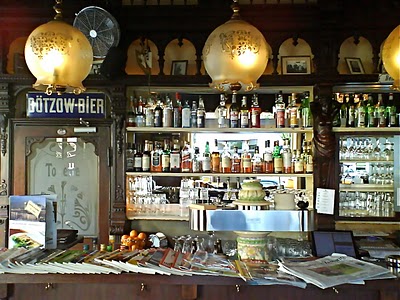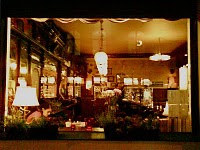I like coming to this corner of Tucholsky Straße for the sunny disposition of the waiters, the comforting Wiener Schnitzel and Bulette, and for the continuity Bötzow represents in a recently gentrified neighbourhood.
Certain facts are clear: Bötzow was a pub and distillery in the 19th century, beer fermenting in the courtyard behind, the smell of hops and yeast wafting to the upper floors. In the 1920s the bar was in the hands of the Bötzow brewery, Berlin’s largest (their sprawling distillery in Prenzlauer Berg has been converted into the Kulturbrauerei arts complex).
After a few flinty glasses of pils, the chatter of voices echoes against the wood panelling, the palimpsest left by old wallpaper, the vases of lilies and sombre curtains. I can hear the voice of old mythologies–ones forgotten and by many discredited. The gas lamps outside illuminate the cobbles differently. Horse hooves echo, the air is spiked with coal. A man in a wool hat turns a newspaper that reads 1919.

Karl Liebknecht leans across the table to his comrade Rosa Luxembourg. Be spontaneous! make revolution! She looks anxiously to the windows and, quickly, they go separate ways. Karl makes for the kitchen. She looks to the blond-haired waiter (he is still there) who nods to the closet (now the toilets). And there she waits, breathing, as the world outside is brought to a hush. Then hard voices intrude. She brings her hand to her mouth, to stifle her words and summon breath. And then they too are gone. It seems like a long time before the young man, wiping his eyes, unlocks the door. The Freicorps were the ones who finally tracked them down, tortured and murdered them.
And the bar stayed, watching through the windows. Its clientele clashed with the fascist bars nearby. Bombs fell, and then the grey times came–the bar remaining open throughout the GDR. And then, suddenly, there was new paint and new owners, and people from places you once couldn’t go. These people decided to leave the interior intact. And the woman on the bar sighed with relief.
She lets her hair fall about her shoulders, and reaches for a bottle (there’s always one nearby). She’s ready for a good time now. She’s seen too much.




